Sharilyn Grayson's Blog, page 2
March 25, 2013
The Mystery Box
Last week, a close friend shared a video on Facebook and tagged me in the post. I almost didn't watch it, because it's eighteen minutes long. But because I trust my friend, I thought, I'll just try the first three or four minutes and see. Eighteen minutes later, my imagination was on fire.

Obviously, everyone else in the room adored J.J. Abrams for producing Lost, but I never noticed him until he made Star Trek in 2009 and won my loyalty forever. I saw that movie in the theater three times and bought it as soon as it came out. So J.J. Abrams is now a guy I want to hear talking for eighteen minutes.

The whole talk centers on the idea of a mystery box. So I immediately started thinking about mystery boxes: the red and blue pills in The Matrix; the rabbit hole in Alice in Wonderland; the strange, pale boy at Forks High who doesn't talk to anyone; the box Pandora was forbidden to open; the apple Eve was forbidden to eat. We are creatures of insatiable curiosity. Lock a door and we will find a way to open it.
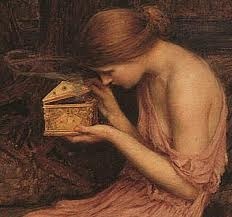
What I love about the Abrams talk is his idea that we are all mystery boxes, each person alive today or who ever lived. And each unfamiliar place is a mystery box. Each new idea is a mystery box. Abrams made me feel like an explorer with vast, untouched horizons in front of me. The world is a mystery box full of mystery boxes. And I think I'm going to go open a few now. Here's the video!
Open the mystery box of the Dawn Hyperdrive world! The first book, Dawn Hyperdrive and the Galactic Handbag of Death, is available at Amazon and Smashwords as an ebook and is coming out as a paperback later this week at my website!

Obviously, everyone else in the room adored J.J. Abrams for producing Lost, but I never noticed him until he made Star Trek in 2009 and won my loyalty forever. I saw that movie in the theater three times and bought it as soon as it came out. So J.J. Abrams is now a guy I want to hear talking for eighteen minutes.

The whole talk centers on the idea of a mystery box. So I immediately started thinking about mystery boxes: the red and blue pills in The Matrix; the rabbit hole in Alice in Wonderland; the strange, pale boy at Forks High who doesn't talk to anyone; the box Pandora was forbidden to open; the apple Eve was forbidden to eat. We are creatures of insatiable curiosity. Lock a door and we will find a way to open it.

What I love about the Abrams talk is his idea that we are all mystery boxes, each person alive today or who ever lived. And each unfamiliar place is a mystery box. Each new idea is a mystery box. Abrams made me feel like an explorer with vast, untouched horizons in front of me. The world is a mystery box full of mystery boxes. And I think I'm going to go open a few now. Here's the video!
Open the mystery box of the Dawn Hyperdrive world! The first book, Dawn Hyperdrive and the Galactic Handbag of Death, is available at Amazon and Smashwords as an ebook and is coming out as a paperback later this week at my website!
Published on March 25, 2013 06:11
March 22, 2013
Now
The last inspiration on my desktop is one I shared before. It means a great deal to me, the girl who gave up ballet in second grade because I had started too late to be really good at it and the teenager who gave up violin in seventh grade because all of the really serious players had started learning when they were toddlers and the young woman who never really thought twice in college about a serious acting career because all of the good movies had already been made.
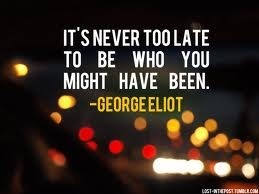
Let me tell you about the woman (yes, the woman - she wrote under a pen name) who puts a friendly, imaginary hand on my shoulder and looks me in the eye and says these words quite clearly to me when I see them. But first, I'd like you to look at her.
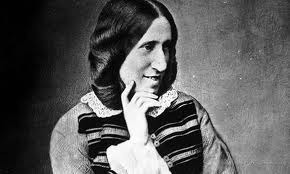
Mary Ann's father assumed when she was five that she would never be lovely and able to marry; so he sent her away to boarding school to be educated. In those all-female boarding schools, she learned Latin and Greek and logic, and she read with appetite. When her mother died, Mary Ann was sixteen. Her formal education ended then so that she could keep house for her father. Though she kept reading and educating herself and questioning the religious teaching of her youth, she remained obedient and quiet at home until she was 30.
Then her life began.

When the man who had told her she was too ugly to marry and refused to hear her spiritual doubts or to let her live and work independently finally died, Mary Ann went to Switzerland and stayed there for a good, long while. When she came back, she found work as an editor and translator and found love with a man who would remain faithful to her for twenty years, until his death. She published the first of seven acclaimed novels when she was thirty-nine.
I am thirty-eight.
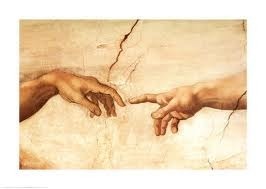
So when Mary Ann Evans tells me that it's never too late for me to be who I might have been, she lifts me from the inactive despair of believing that my opportunities have passed me by long ago. I believe her, because she lived what she said. She died at the age of sixty having made her mark on the world. If I live only that long, I want to spend every day of the twenty-two years left to me doing what I love. I want to open my eyes to the world. I want to connect with the valuable, individual human beings around me. I want to choose my innermost desires. I want to wow the Muse. I want to do all that is in my heart. It's never too late to start.
Read Dawn Hyperdrive and the Galactic Handbag of Death at Amazon or at Smashwords, and read the first chapter free at my website, where the paperback edition will be available starting next week!

Let me tell you about the woman (yes, the woman - she wrote under a pen name) who puts a friendly, imaginary hand on my shoulder and looks me in the eye and says these words quite clearly to me when I see them. But first, I'd like you to look at her.

Mary Ann's father assumed when she was five that she would never be lovely and able to marry; so he sent her away to boarding school to be educated. In those all-female boarding schools, she learned Latin and Greek and logic, and she read with appetite. When her mother died, Mary Ann was sixteen. Her formal education ended then so that she could keep house for her father. Though she kept reading and educating herself and questioning the religious teaching of her youth, she remained obedient and quiet at home until she was 30.
Then her life began.

When the man who had told her she was too ugly to marry and refused to hear her spiritual doubts or to let her live and work independently finally died, Mary Ann went to Switzerland and stayed there for a good, long while. When she came back, she found work as an editor and translator and found love with a man who would remain faithful to her for twenty years, until his death. She published the first of seven acclaimed novels when she was thirty-nine.
I am thirty-eight.

So when Mary Ann Evans tells me that it's never too late for me to be who I might have been, she lifts me from the inactive despair of believing that my opportunities have passed me by long ago. I believe her, because she lived what she said. She died at the age of sixty having made her mark on the world. If I live only that long, I want to spend every day of the twenty-two years left to me doing what I love. I want to open my eyes to the world. I want to connect with the valuable, individual human beings around me. I want to choose my innermost desires. I want to wow the Muse. I want to do all that is in my heart. It's never too late to start.
Read Dawn Hyperdrive and the Galactic Handbag of Death at Amazon or at Smashwords, and read the first chapter free at my website, where the paperback edition will be available starting next week!
Published on March 22, 2013 07:48
March 21, 2013
Present

This painting is one I love. The artist used so many different colors for the clouds and such a lovely shade of blue for the sky. I like the peace of quiet country fields, and I like the scale of the human figures in the world around them. What I see in this image is that hard work is necessary and honorable and beautiful; that ordinary people, whether we only pass through a certain patch of land or whether we see it and handle it every day, fit naturally into the grander scheme of the universe; and that no matter how muddy our shoes, we all share the same, glorious heavens.

But I have the luxury of space and time and the changes both have wrought on the world showing me what I see in that wheat field. If I had been the farmer, I would have noticed the clouds only as they told me the weather. I would have noticed the horse and rider only through a whole overlay of personal history that shaped how I felt about seeing him near that field. If I had met the artist sitting day after day with his paints while I worked with my hands, I would probably have resented any prompt from him to look at the heavens. After all, I'd only have time to look at them properly when my back was too bent and my hands too stiff and my legs too slow to work a full day anymore.

And in my life now, with my washing machine and bank account and instant access to global news, what do I miss? What glorious heavens stretch over me unnoticed? What fellow travelers leave without a word? What truth do I fail to draw from the well of the world because I pass it by with my eyes lowered?

So one of the reminders on my computer desktop is: I am present. Because I completely and utterly adore Kate DiCamillo for giving the world Edward Tulane and Despereaux and Opal and Mercy Watson, I read her Facebook posts. One of them mused on the old schoolroom habit of saying "present" when the teacher called your name, and Kate expanded into the notion of saying to the world around you calling your name, "I am present."
To whatever is calling my name today - I am present. I am listening. I am here.
My first book, Dawn Hyperdrive and the Galactic Handbag of Death, is available from Amazon for Kindles and Kindle apps and from Smashwords for all other e-readers. Check out my website to read the first chapter free!
Published on March 21, 2013 05:23
March 20, 2013
Relentless
Here is something my husband does: he uses dry-erase markers on things that are not dry-erase boards. Mirrors, windows, refrigerator doors - I will randomly find to-do lists, upcoming bills, people to call, exercise routines, or inspirational quotes on any surface that will take (and hopefully one day lose) dry-erase ink. So I find dry-erase markers in unusual places in our house, like the bathroom sink.

One time that habit came in handy for me. I was folding clothes on the bed and half-listening to an interview on the radio in my bathroom, which was tuned to NPR. It seemed like an appropriate clothes-folding soundtrack. But suddenly the person being interviewed mentioned Steven Pressfield, the author who brought Sparta to vivid, shocking life for me years ago in Gates of Fire . I tried and failed, I'm sure through some disastrous fault of my own, to read Tides of War , but Gates of Fire had seared Steven Pressfield's name into my memory. So I went into the bathroom to hear the interview better. And I heard and scrawled in dry-erase ink the following quote from Pressfield: Show the Muse you're serious.
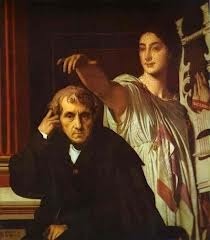
Whenever I'd thought of the Muse before, I'd regarded her as the personification of inspiration or luck. If I saw her at all, I saw her dancing away from me out of sheer perversity. But Pressfield made me think of her another way - as a severe but valuable teacher I wanted to impress. I'm sure you've heard the Mary Heaton Vorse quote: "The art of writing is the art of applying the seat of the pants to the seat of the chair." Well, I thought as I looked at the words on my bathroom mirror, that I can do.

It was the work of a moment, as Bertie Wooster would say, to change the time on my alarm as I stood there, contemplating. The next morning, I woke up at four. I did the same thing every weekday for a few months. And for a while, rising early worked for me. It boosted me over the feeling that I had no time to spare for writing. Then daylight savings time arrived and completely kicked my butt. I lost my rhythm. But from time to time, especially when I stopped writing every day, I set my alarm early. I wanted those extra hours, yes, but I also wanted to prove myself to the Muse. Look, I would say as I opened my computer while stars still winked sleepily outside, I'm serious, lady. So you'd just better show up.
Read my first book, Dawn Hyperdrive and the Galactic Handbag of Death! You can find a copy at Amazon or Smashwords, and you can try the first chapter free at my website.

One time that habit came in handy for me. I was folding clothes on the bed and half-listening to an interview on the radio in my bathroom, which was tuned to NPR. It seemed like an appropriate clothes-folding soundtrack. But suddenly the person being interviewed mentioned Steven Pressfield, the author who brought Sparta to vivid, shocking life for me years ago in Gates of Fire . I tried and failed, I'm sure through some disastrous fault of my own, to read Tides of War , but Gates of Fire had seared Steven Pressfield's name into my memory. So I went into the bathroom to hear the interview better. And I heard and scrawled in dry-erase ink the following quote from Pressfield: Show the Muse you're serious.

Whenever I'd thought of the Muse before, I'd regarded her as the personification of inspiration or luck. If I saw her at all, I saw her dancing away from me out of sheer perversity. But Pressfield made me think of her another way - as a severe but valuable teacher I wanted to impress. I'm sure you've heard the Mary Heaton Vorse quote: "The art of writing is the art of applying the seat of the pants to the seat of the chair." Well, I thought as I looked at the words on my bathroom mirror, that I can do.

It was the work of a moment, as Bertie Wooster would say, to change the time on my alarm as I stood there, contemplating. The next morning, I woke up at four. I did the same thing every weekday for a few months. And for a while, rising early worked for me. It boosted me over the feeling that I had no time to spare for writing. Then daylight savings time arrived and completely kicked my butt. I lost my rhythm. But from time to time, especially when I stopped writing every day, I set my alarm early. I wanted those extra hours, yes, but I also wanted to prove myself to the Muse. Look, I would say as I opened my computer while stars still winked sleepily outside, I'm serious, lady. So you'd just better show up.
Read my first book, Dawn Hyperdrive and the Galactic Handbag of Death! You can find a copy at Amazon or Smashwords, and you can try the first chapter free at my website.
Published on March 20, 2013 02:43
March 19, 2013
Dream
Another of the words of inspiration on the desktop of my computer is actually a phrase from the Old Testament: "Do all that is in your heart."
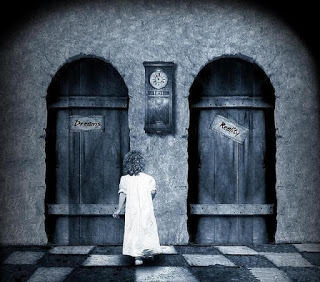
I don't know how you hear those words. Maybe they sound like an order to you, or maybe they sound like a dare. To me, they sound gentle. They are permission: a paid ticket, an arm extended to the horizon, a soft nudge and whisper, an open door.

Where I used to live, I had to drive up a steep hill to go home. As my car ascended, the incline hid the neighborhood beneath so that I felt that I was driving right into the sky. Only at the last minute did the road appear under my tires, reassuringly solid, while the houses flashed into view as if I had crossed into another world entirely.
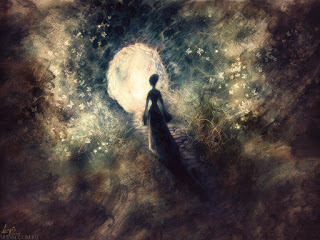
"Do all that is in your heart." Those words fill me with that same thrill of possibility, that same sense that a door is opening within me and inviting me inside. I need that kind of encouragement on days when I am too busy to create, on days when the full kitchen sink or the paid work waiting on my desk demand that I give them everything I have. Obligation is a bold and heartless thief.

When I invoke this phrase, "Do all that is in your heart," it acts as a kind of force-field against the obligation that harries me. It reminds me that I have permission to create. The doors are open to me. I can pass through them into whatever horizon appears to receive me.
Read my debut space adventure novel for kids: Dawn Hyperdrive and the Galactic Handbag of Death! You can buy a copy at Amazon or Smashwords, and you can try the first chapter free at my website.

I don't know how you hear those words. Maybe they sound like an order to you, or maybe they sound like a dare. To me, they sound gentle. They are permission: a paid ticket, an arm extended to the horizon, a soft nudge and whisper, an open door.

Where I used to live, I had to drive up a steep hill to go home. As my car ascended, the incline hid the neighborhood beneath so that I felt that I was driving right into the sky. Only at the last minute did the road appear under my tires, reassuringly solid, while the houses flashed into view as if I had crossed into another world entirely.

"Do all that is in your heart." Those words fill me with that same thrill of possibility, that same sense that a door is opening within me and inviting me inside. I need that kind of encouragement on days when I am too busy to create, on days when the full kitchen sink or the paid work waiting on my desk demand that I give them everything I have. Obligation is a bold and heartless thief.

When I invoke this phrase, "Do all that is in your heart," it acts as a kind of force-field against the obligation that harries me. It reminds me that I have permission to create. The doors are open to me. I can pass through them into whatever horizon appears to receive me.
Read my debut space adventure novel for kids: Dawn Hyperdrive and the Galactic Handbag of Death! You can buy a copy at Amazon or Smashwords, and you can try the first chapter free at my website.
Published on March 19, 2013 10:16
March 18, 2013
Connection
Connection does not come naturally to me. Part of my soul constantly longs for silence and solitude, something in short supply around my house. Do you remember that scene in Date Night where Tina Fey's character talks about her fantasy of checking into a hotel alone? I was so tracking with her. It would be kind of like being a hermit, minus the poor personal hygiene and sparse diet.

So it's ironic that one of my favorite books is Howard's End by E.M. Forster, because Forster's epigram and main theme is "Only Connect." The characters in the book suffer when they fail to make the connections presented to them. In fact, the snobbish isolation of the main family, the Wilcoxes, eventually disgraces and ruins them, while the foolishly generous and warm-hearted connection of the Schlegels secures them an inheritance.
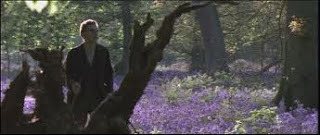
The Schlegels befriend a poor man, Leonard Bast, who works as a clerk in an office, a job that neither excites nor engages him. Then one day, a description of nature that he reads in a book connects so deeply with him that he walks all night under the stars to recreate that connection in reality. Afterwards, he can't keep from sharing his experience with real people.

I think that Leonard has to share his deep connection to nature with other people because we human beings are necessary to one another. We rub off each other's rough edges and comfort one another in a way that no food or substance or indulgence can match. We matter to each other. We show each other truths and beauties that we would never know alone.

And when we finally "slipped the surly bonds of Earth / Put out [a] hand and touched the face of God," we turned around and looked at ourselves. For the first time, we saw our fragile home: the small, warm island in an ocean of cold and lifeless night where each of us draws breath. We are bound to one another here in a community of mutual life. And one of the noblest and best jobs an author can do is to show us one of those small, temporary, momentous connections while it lasts. Here is the epigram of our existence: only connect.
Buy Dawn Hyperdrive and the Galactic Handbag of Death at Amazon or Smashwords, and try the first chapter free at my website first!

So it's ironic that one of my favorite books is Howard's End by E.M. Forster, because Forster's epigram and main theme is "Only Connect." The characters in the book suffer when they fail to make the connections presented to them. In fact, the snobbish isolation of the main family, the Wilcoxes, eventually disgraces and ruins them, while the foolishly generous and warm-hearted connection of the Schlegels secures them an inheritance.

The Schlegels befriend a poor man, Leonard Bast, who works as a clerk in an office, a job that neither excites nor engages him. Then one day, a description of nature that he reads in a book connects so deeply with him that he walks all night under the stars to recreate that connection in reality. Afterwards, he can't keep from sharing his experience with real people.

I think that Leonard has to share his deep connection to nature with other people because we human beings are necessary to one another. We rub off each other's rough edges and comfort one another in a way that no food or substance or indulgence can match. We matter to each other. We show each other truths and beauties that we would never know alone.

And when we finally "slipped the surly bonds of Earth / Put out [a] hand and touched the face of God," we turned around and looked at ourselves. For the first time, we saw our fragile home: the small, warm island in an ocean of cold and lifeless night where each of us draws breath. We are bound to one another here in a community of mutual life. And one of the noblest and best jobs an author can do is to show us one of those small, temporary, momentous connections while it lasts. Here is the epigram of our existence: only connect.
Buy Dawn Hyperdrive and the Galactic Handbag of Death at Amazon or Smashwords, and try the first chapter free at my website first!
Published on March 18, 2013 07:14
March 15, 2013
Integrity
I need reminders around me of what is important to me. Maybe you do, too. So my wallpaper on my computer, what I see every morning as soon as I turn it on, is a collection of quotes that inspire me. One of them I've shared in a previous post, but I'll return to it and give it some individual love and attention some time in the future.
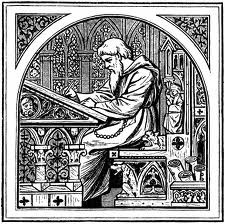
One that I haven't referenced yet comes from First Things First , by Stephen Covey. That book really helped me to think about who I am and what is important to me. But what is more valuable to me is that it showed me a fault and offered me a solution. My fault is that I don't always do what I know is best or wisest or most helpful in the long run. And the solution it offered (not the only one that works for me, but a good one) is this phrase: Integrity in the moment of choice.
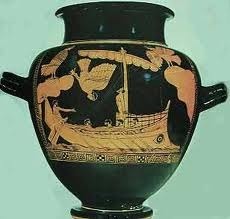
Now moments of choice fall upon me thick and fast, and I often totally flunk the integrity test. But when I pass it, I notice a few common factors. I've spent time lately thinking about what I love, what's really vital to me, and what life will be like when all of those parts click. I've prepared what I need to do just a small bit towards my particular bliss. And I've taken precautions to limit my distractions and obstacles. Like Ulysses, I've seen that the sirens could lure me away, and I've stopped my ears and allowed my better impulses to lash me to the mast of my innermost desires.
What drives me to integrity is not despair over past failures or sheer willpower to achieve a goal; it is love. It is the remembrance of a cherished dream. It is the warm hearth of possibilities that belong to me.
Read Dawn Hyperdrive and the Galactic Handbag of Death today! It's available at Amazon or Smashwords, and you can always try before you buy at my website.

One that I haven't referenced yet comes from First Things First , by Stephen Covey. That book really helped me to think about who I am and what is important to me. But what is more valuable to me is that it showed me a fault and offered me a solution. My fault is that I don't always do what I know is best or wisest or most helpful in the long run. And the solution it offered (not the only one that works for me, but a good one) is this phrase: Integrity in the moment of choice.

Now moments of choice fall upon me thick and fast, and I often totally flunk the integrity test. But when I pass it, I notice a few common factors. I've spent time lately thinking about what I love, what's really vital to me, and what life will be like when all of those parts click. I've prepared what I need to do just a small bit towards my particular bliss. And I've taken precautions to limit my distractions and obstacles. Like Ulysses, I've seen that the sirens could lure me away, and I've stopped my ears and allowed my better impulses to lash me to the mast of my innermost desires.
What drives me to integrity is not despair over past failures or sheer willpower to achieve a goal; it is love. It is the remembrance of a cherished dream. It is the warm hearth of possibilities that belong to me.
Read Dawn Hyperdrive and the Galactic Handbag of Death today! It's available at Amazon or Smashwords, and you can always try before you buy at my website.
Published on March 15, 2013 07:12
March 14, 2013
Fit
I don't mean "get fit," though search engines love to toss diet plans and exercise routines and machines my way when I search it. I mean suitable. I mean appropriate and right and proper. And when you talk about making anything for kids, what fits is an important consideration.

They're not merely little adults. You can't take something suitable for adults and make it shorter and shinier and shove it at them. But they're going to become adults one day. So you also can't keep them in a protective bubble with no idea of what the world is like. They need something on their level - something just right for them.

Fairy tales are a great compromise - a fabulous middle path. Years ago, when my two oldest girls were tiny, I read a book called A Landscape with Dragons, which talked about the value of fairy tales in teaching children what is right and teaching them that they have the power to do what is right. You can use the symbols in fairy tales to stand for some pretty bad things without going into the details. Kids come up with enough detail about witches and ogres and dragons and hags all by themselves. You've heard before that a picture is worth a thousand words? Well, so is a symbol.

And the great thing is that, because the reader supplies the details, the symbol speaks to him where he is. It acts in a way like a mirror, helping him see truth not only about the world but also about himself. So kids see kid-sized truths. And adults see adult-sized truths. As long as the symbol rings true in the work, it rings true in the reader.
My three-year-old daughter Jane just walked in and saw pictures of dragons on my screen as I searched for one scary enough to insert above.
"What are those - dragons? I don't like dragons," she said. "They scare me."
"They scare me, too," I said absently, copying the image I had decided to use and only half listening.
"So I will be great big, and I will beat up that dragon. And I will stomp him and kill him, and I will save you," she said.
I nearly stopped breathing. I definitely stopped writing. I took her hands and looked her in the eye.
"Yes, you will," I told her. "Thank you."

Buy your copy of Dawn Hyperdrive and the Galactic Handbag of Death at Amazon or at Smashwords, or try the first chapter at my website.

They're not merely little adults. You can't take something suitable for adults and make it shorter and shinier and shove it at them. But they're going to become adults one day. So you also can't keep them in a protective bubble with no idea of what the world is like. They need something on their level - something just right for them.

Fairy tales are a great compromise - a fabulous middle path. Years ago, when my two oldest girls were tiny, I read a book called A Landscape with Dragons, which talked about the value of fairy tales in teaching children what is right and teaching them that they have the power to do what is right. You can use the symbols in fairy tales to stand for some pretty bad things without going into the details. Kids come up with enough detail about witches and ogres and dragons and hags all by themselves. You've heard before that a picture is worth a thousand words? Well, so is a symbol.

And the great thing is that, because the reader supplies the details, the symbol speaks to him where he is. It acts in a way like a mirror, helping him see truth not only about the world but also about himself. So kids see kid-sized truths. And adults see adult-sized truths. As long as the symbol rings true in the work, it rings true in the reader.
My three-year-old daughter Jane just walked in and saw pictures of dragons on my screen as I searched for one scary enough to insert above.
"What are those - dragons? I don't like dragons," she said. "They scare me."
"They scare me, too," I said absently, copying the image I had decided to use and only half listening.
"So I will be great big, and I will beat up that dragon. And I will stomp him and kill him, and I will save you," she said.
I nearly stopped breathing. I definitely stopped writing. I took her hands and looked her in the eye.
"Yes, you will," I told her. "Thank you."

Buy your copy of Dawn Hyperdrive and the Galactic Handbag of Death at Amazon or at Smashwords, or try the first chapter at my website.
Published on March 14, 2013 07:58
March 13, 2013
User
So I knew that my villain had to be a pirate. And I was left wondering what she was going to steal. Captain Hook kidnapped Tiger Lily and the Lost Boys, ordered Tinker Bell to be kidnapped, and planted a bomb to kill Peter Pan; he seemed to specialize in kidnap and murder, not theft. Then I thought about Hook's drive to kill Peter Pan, the spirit of eternal youth, and I thought: that's what Mrs. Scales wants to steal - youth. But I saw a problem with that thought. You can't quantify youth. It's not a substance but an absence. It's the absence of age - the sum of the years and experiences that have not yet come.
So how would a villain steal youth?

Remember that lack of empathy from the movie clip yesterday, that signature calling card of evil? That's how. You can't take away something that doesn't exist yet. But if something inside you twists your soul and causes you pain, like lust or greed or ambition, you can force someone to bear the burden of your pain as long as that person is less powerful than you are. If you don't care what bearing that burden does to your victim, you can force her to do terrible things.

Like Captain James Hook, my villain ran from a violent, insatiable clock - the thousands of years that had deformed and twisted her. And because she had no empathy, she could force innocent children to bear the burden of her age. She fit the profile of all abusers. In her mind, she stripped her victims of power and will and an individual soul and saw them only as vessels that existed to receive what she could not stand alone.

Warlords who steal children from their homes and force them to fight act this way. So do brothel owners who buy or trick or steal children from their parents and force them into prostitution. So do factory owners who entrap children into long days of labor with little or no pay. Each of these abusers denies the reality of who a child is and what she needs: safety, protection, education, and provision. Abusers see only their own need for power or gratification or money. They are pirates. They are users. And they are evil.
If I was going to kill a villain, I wanted to kill that kind of villain. But how could I show a villain this evil in a book for kids?
Read Dawn Hyperdrive and the Galactic Handbag of Death, available now at Amazon for Kindles and Kindle apps or at Smashwords for all other e-readers, including Nook and Kobo! You can try before you buy at my website.
So how would a villain steal youth?

Remember that lack of empathy from the movie clip yesterday, that signature calling card of evil? That's how. You can't take away something that doesn't exist yet. But if something inside you twists your soul and causes you pain, like lust or greed or ambition, you can force someone to bear the burden of your pain as long as that person is less powerful than you are. If you don't care what bearing that burden does to your victim, you can force her to do terrible things.

Like Captain James Hook, my villain ran from a violent, insatiable clock - the thousands of years that had deformed and twisted her. And because she had no empathy, she could force innocent children to bear the burden of her age. She fit the profile of all abusers. In her mind, she stripped her victims of power and will and an individual soul and saw them only as vessels that existed to receive what she could not stand alone.

Warlords who steal children from their homes and force them to fight act this way. So do brothel owners who buy or trick or steal children from their parents and force them into prostitution. So do factory owners who entrap children into long days of labor with little or no pay. Each of these abusers denies the reality of who a child is and what she needs: safety, protection, education, and provision. Abusers see only their own need for power or gratification or money. They are pirates. They are users. And they are evil.
If I was going to kill a villain, I wanted to kill that kind of villain. But how could I show a villain this evil in a book for kids?
Read Dawn Hyperdrive and the Galactic Handbag of Death, available now at Amazon for Kindles and Kindle apps or at Smashwords for all other e-readers, including Nook and Kobo! You can try before you buy at my website.
Published on March 13, 2013 09:34
March 12, 2013
Evil
The villain in Peter Pan is a pirate. Now Captain James Hook honestly looks a little hilarious, with his goofy hat and Jay Leno chin and twitchy mustache. His melodramatic temper tantrums and physical terror of the crocodile are also kind of funny. It's hard to take him seriously.
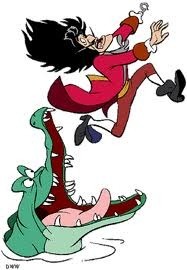
But real pirates, we can take seriously. Real pirates were (and are still, in places like Somalia) men who stole, tortured, raped, murdered, and kidnapped in order to gain power and treasure. They were diabolical crosses between Bernie Madoff and Idi Amin who were untouchable in their floating fortresses. They flew the skull-and-crossbones flag for a reason: it was fair warning to expect death.
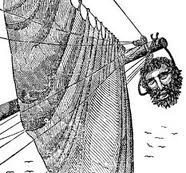
We can say pretty fairly that real pirates are evil. But I don't want to toss that word around. I want to sit with it a minute. The video clip below is one of the most important pieces of film I've seen in the last decade or so. It changed the way I view evil. Tomorrow, I'll look at the way I depicted evil in my book.
Dawn Hyperdrive and the Galactic Handbag of Death is available from Amazon for Kindle and Kindle apps and at Smashwords for all other e-readers. Try before you buy at my website.

But real pirates, we can take seriously. Real pirates were (and are still, in places like Somalia) men who stole, tortured, raped, murdered, and kidnapped in order to gain power and treasure. They were diabolical crosses between Bernie Madoff and Idi Amin who were untouchable in their floating fortresses. They flew the skull-and-crossbones flag for a reason: it was fair warning to expect death.

We can say pretty fairly that real pirates are evil. But I don't want to toss that word around. I want to sit with it a minute. The video clip below is one of the most important pieces of film I've seen in the last decade or so. It changed the way I view evil. Tomorrow, I'll look at the way I depicted evil in my book.
Dawn Hyperdrive and the Galactic Handbag of Death is available from Amazon for Kindle and Kindle apps and at Smashwords for all other e-readers. Try before you buy at my website.
Published on March 12, 2013 05:03



